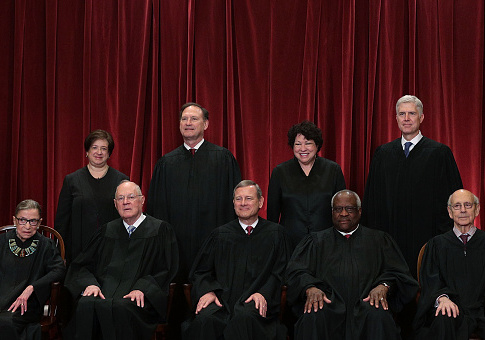An all-Asian rock band calling itself "the Slants" could not be denied the right to patent its name on grounds of being too offensive, the Supreme Court found in a unanimous ruling.
The band was originally formed by respondent Simon Tam, who chose the moniker to represent his group's pride in their shared ethnicity and "take on these stereotypes that people have about us, like the slanted eyes, and own them." ("Slant" is generally considered a derogatory term.)
But when Tam attempted to trademark the name, his application was denied by the U.S. Patent and Trademark Office for violating a section of the Lanham Act, the relevant part of federal trademark law which rejects trademarks "which may disparage … persons, living or dead, institutions, beliefs, or national symbols."
Tam took the case to federal court, where the relevant clause was struck down for violating the First Amendment.
The Supreme Court has upheld that conclusion in Matal v. Tam (the case originated was Lee v. Tam, but changed with the appointment of Joseph Matal as PTO Director). Justice Samuel Alito wrote the majority opinion, which was joined by the rest of the Court in its 8-0 conclusion, albeit not universally in its reasoning. Justice Neil Gorsuch did not participate.
Alito concluded that the trademark rule violated the prohibition on government viewpoint discrimination as regards speech.
The disparagement clause "offends a bedrock First Amendment principle: Speech may not be banned on the ground that it expresses ideas that offend," Alito wrote.
Tam responded to the news with a jubilant post on his Facebook page.
"After an excruciating legal battle that has spanned nearly eight years, we're beyond humbled and thrilled to have won this case at the Supreme Court," he wrote.
The case has far-reaching implications, most notably in the on-going legal battle by the Washington Redskins to secure a trademark for its controversial team name, the Washington Post reported. The team has not yet commented on the ruling, but did try to involve itself in the case while it was ongoing.
